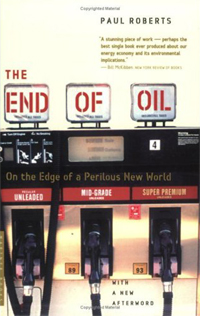 Image via Wikipedia
Image via WikipediaWe've all seen the despairing footage of the gulf coast's smothered wildlife and watched helplessly as the region is decimated by mounting volumes of oil. Americans are undoubtedly contemplating the variables in this unfortunate catastrophe, wondering, "What else could we have done to prevent this?" While the spill itself is by all technical measures a result of BP's oil well failure, it must be argued that an equal cause for the disaster lies in the sheer volume of oil encapsulated there prior to the malfunction.
The mounting oil brewed within BP's wells is the result of an increasing societal dependence on the substance, caused by years of harboring its fuel for both personal livelihood and industrial development. According to trends analyzed by the U.S. Energy Information Administration's International Energy Outlook for 2010, worldwide consumption of liquid energy sources and petroleum has grown from less than 150 quadrillion Btu in 1990 to nearly 175 quadrillion Btu in 2007. This trend is expected to continue, with a projected rise in usage from 86.1 million barrels per day in 2007 to 92.1 million barrels in 2020.
As a foundational component and crutch to economic and industrial development in the modern world, oil has become as vital as water to American's health and livelihood. Beyond the blatant consumption of the automobile and fuel industries, manufacturers and industrial centers exploit the substance at alarming rates; justifying their use with the competitive demands generated by commercial and consumer markets.
Oil usage is not projected to improve and future disasters such as the one engulfing the southern coast are bound to strike again. While many portions of the industrial sector choose to ignore this imminent truth for the gain of short-term financial returns, select manufacturers are making active strides to reduce the nation's oil dependence and promote environmentally sustainable production processes.
Located in Lancaster, Pennsylvania, ECORE International has built a thriving business out of finding creative ways to reduce, reuse, and recycle. As one small, privately owned manufacturing organization they conserve over one million barrels of oil each year while recycling over 80 million pounds of scrap tire rubber into products for various commercial and industrial markets. The amount of energy saved each year, by this company alone, is equivalent to the heating of over 600 homes.
While it is discouraging that these conservation efforts are not being undertaken by the majority of the industrial sector, those companies who have embraced alternate production means remain undeterred in their advocacy for change. The oil disaster continues to wreak havoc on the natural environment, while these companies fight to sustain it.
Holly DeVries is a Marketing Specialist at ECORE International.
ECORE International has been at the forefront of recycling efforts since its inception in 1989. As North America's largest user of recycled scrap tire rubber, the company processes more than 80 million pounds of scrap tire rubber each year and helps to conserve more than one million barrels of oil in the process to convert pliable treads into durable product solutions for commercial, industrial, and architectural applications.
To learn more about ECORE's products and production processes visit: http://www.ecoreintl.com
Article Source: http://EzineArticles.com/?expert=Holly_DeVries
http://EzineArticles.com/?Oil-Reform---Manufacturers-Fight-For-Change&id=4680764

No comments:
Post a Comment